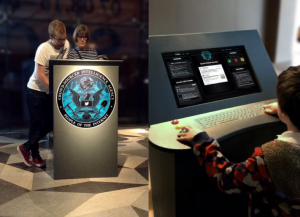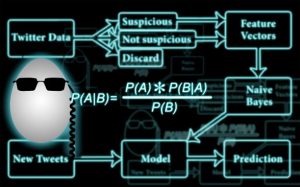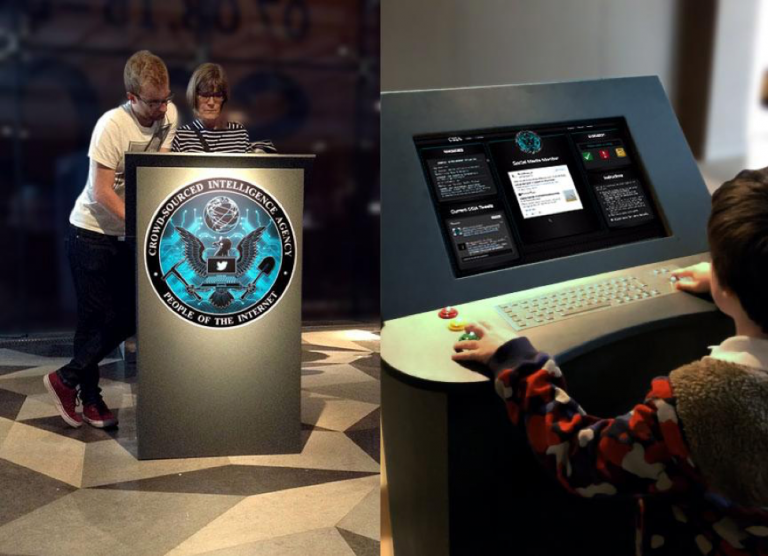
CSIA Installation.
Derek Curry, CAMD Assistant Professor, and Jennifer Gradecki, Assistant Teaching Professor, recently presented a collaborative project at the Ars Electronica Festival, the oldest new media festival in the world, established in 1979. Their project, entitled the Crowd-Sourced Intelligence Agency (CSIA), is a creative research project that partially replicates an open-source intelligence (OSINT) surveillance system. It allows users to see how their Twitter posts would look to an intelligence agent through an OSINT interface. Read more about the research project here.
“The CSIA is a publicly accessible Open Source Intelligence (OSINT) system that was constructed using information gathered from technical manuals, research reports, academic papers, leaked documents, and Freedom of Information Act files,” explained Derek and Jennifer. “The project was commissioned by Science Gallery Dublin in 2015. By replicating known data processing techniques, CSIA allows for a practice-based awareness of dataveillance techniques, and exposes potential problems or oversights inherent in the process.”

Watchlist interface.
The Ars Electronica Festival is hosted by Ars Electronica, a center for electronic arts located in Linz, Austria. Some call the center “the museum of the future,” in which all sorts of merging art, science and technology are shown and explored. Once a year, for the festival, the organization invites artists, scientists and researchers from all over the world to confront a specific, interdisciplinary theme in the context of speeches, workshops, exhibitions and symposia. Each year’s festival is dedicated to a different issue, and the theme this year was Artificial Intelligence.
“The CSIA features two Naïve Bayes supervised machine-learning algorithms that automate the evaluation of social media posts. Machine-learning is the type of AI intelligence agencies use in predictive policing programs to process the troves of data that are collected from publicly available sources/ In these systems, statistical pattern recognition supplements, and perhaps alters, human judgment,” they continued. “When users of the app monitor their own posts and the posts of their friends, they can see how automated processing changes, reinterprets, reframes, and recontextualizes their posts, along with how a recommendation from a predictive policing algorithm can affect one’s judgement.”

Algorithm.
Both Derek and Jennifer are new faculty members to the College of Arts, Media and Design (CAMD). Derek is teaching Rapid Idea Prototyping, while Jennifer is teaching 5D: Experience and Drawing, Game Interface Design and Rapid Idea Prototyping. We are thrilled to welcome them both to the CAMD community, and look forward to their contribution to the Game Design department and beyond.


